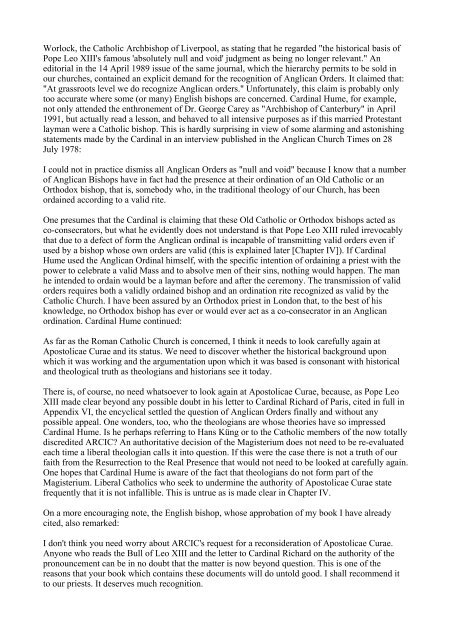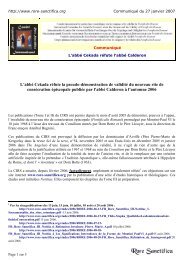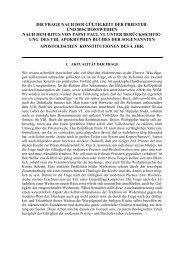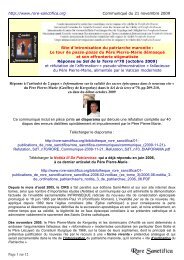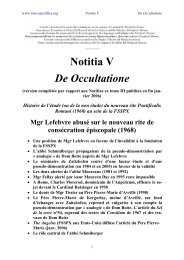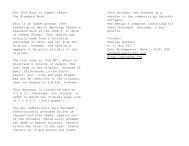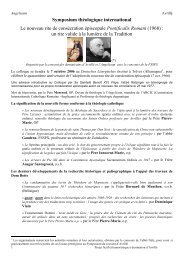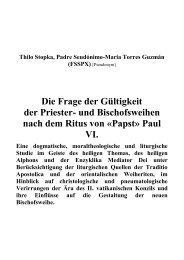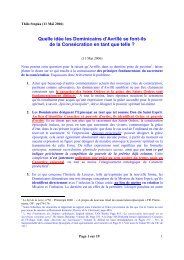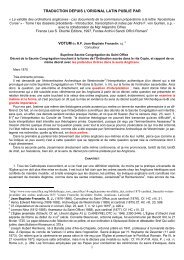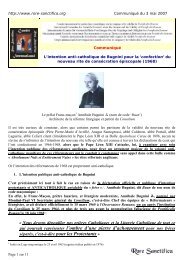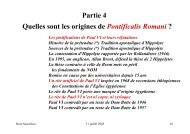THE ORDER OF MELCHISEDECH A Defence of ... - Rore Sanctifica
THE ORDER OF MELCHISEDECH A Defence of ... - Rore Sanctifica
THE ORDER OF MELCHISEDECH A Defence of ... - Rore Sanctifica
You also want an ePaper? Increase the reach of your titles
YUMPU automatically turns print PDFs into web optimized ePapers that Google loves.
Worlock, the Catholic Archbishop <strong>of</strong> Liverpool, as stating that he regarded "the historical basis <strong>of</strong><br />
Pope Leo XIII's famous 'absolutely null and void' judgment as being no longer relevant." An<br />
editorial in the 14 April 1989 issue <strong>of</strong> the same journal, which the hierarchy permits to be sold in<br />
our churches, contained an explicit demand for the recognition <strong>of</strong> Anglican Orders. It claimed that:<br />
"At grassroots level we do recognize Anglican orders." Unfortunately, this claim is probably only<br />
too accurate where some (or many) English bishops are concerned. Cardinal Hume, for example,<br />
not only attended the enthronement <strong>of</strong> Dr. George Carey as "Archbishop <strong>of</strong> Canterbury" in April<br />
1991, but actually read a lesson, and behaved to all intensive purposes as if this married Protestant<br />
layman were a Catholic bishop. This is hardly surprising in view <strong>of</strong> some alarming and astonishing<br />
statements made by the Cardinal in an interview published in the Anglican Church Times on 28<br />
July 1978:<br />
I could not in practice dismiss all Anglican Orders as "null and void" because I know that a number<br />
<strong>of</strong> Anglican Bishops have in fact had the presence at their ordination <strong>of</strong> an Old Catholic or an<br />
Orthodox bishop, that is, somebody who, in the traditional theology <strong>of</strong> our Church, has been<br />
ordained according to a valid rite.<br />
One presumes that the Cardinal is claiming that these Old Catholic or Orthodox bishops acted as<br />
co-consecrators, but what he evidently does not understand is that Pope Leo XIII ruled irrevocably<br />
that due to a defect <strong>of</strong> form the Anglican ordinal is incapable <strong>of</strong> transmitting valid orders even if<br />
used by a bishop whose own orders are valid (this is explained later [Chapter IV]). If Cardinal<br />
Hume used the Anglican Ordinal himself, with the specific intention <strong>of</strong> ordaining a priest with the<br />
power to celebrate a valid Mass and to absolve men <strong>of</strong> their sins, nothing would happen. The man<br />
he intended to ordain would be a layman before and after the ceremony. The transmission <strong>of</strong> valid<br />
orders requires both a validly ordained bishop and an ordination rite recognized as valid by the<br />
Catholic Church. I have been assured by an Orthodox priest in London that, to the best <strong>of</strong> his<br />
knowledge, no Orthodox bishop has ever or would ever act as a co-consecrator in an Anglican<br />
ordination. Cardinal Hume continued:<br />
As far as the Roman Catholic Church is concerned, I think it needs to look carefully again at<br />
Apostolicae Curae and its status. We need to discover whether the historical background upon<br />
which it was working and the argumentation upon which it was based is consonant with historical<br />
and theological truth as theologians and historians see it today.<br />
There is, <strong>of</strong> course, no need whatsoever to look again at Apostolicae Curae, because, as Pope Leo<br />
XIII made clear beyond any possible doubt in his letter to Cardinal Richard <strong>of</strong> Paris, cited in full in<br />
Appendix VI, the encyclical settled the question <strong>of</strong> Anglican Orders finally and without any<br />
possible appeal. One wonders, too, who the theologians are whose theories have so impressed<br />
Cardinal Hume. Is he perhaps referring to Hans Küng or to the Catholic members <strong>of</strong> the now totally<br />
discredited ARCIC? An authoritative decision <strong>of</strong> the Magisterium does not need to be re-evaluated<br />
each time a liberal theologian calls it into question. If this were the case there is not a truth <strong>of</strong> our<br />
faith from the Resurrection to the Real Presence that would not need to be looked at carefully again.<br />
One hopes that Cardinal Hume is aware <strong>of</strong> the fact that theologians do not form part <strong>of</strong> the<br />
Magisterium. Liberal Catholics who seek to undermine the authority <strong>of</strong> Apostolicae Curae state<br />
frequently that it is not infallible. This is untrue as is made clear in Chapter IV.<br />
On a more encouraging note, the English bishop, whose approbation <strong>of</strong> my book I have already<br />
cited, also remarked:<br />
I don't think you need worry about ARCIC's request for a reconsideration <strong>of</strong> Apostolicae Curae.<br />
Anyone who reads the Bull <strong>of</strong> Leo XIII and the letter to Cardinal Richard on the authority <strong>of</strong> the<br />
pronouncement can be in no doubt that the matter is now beyond question. This is one <strong>of</strong> the<br />
reasons that your book which contains these documents will do untold good. I shall recommend it<br />
to our priests. It deserves much recognition.


